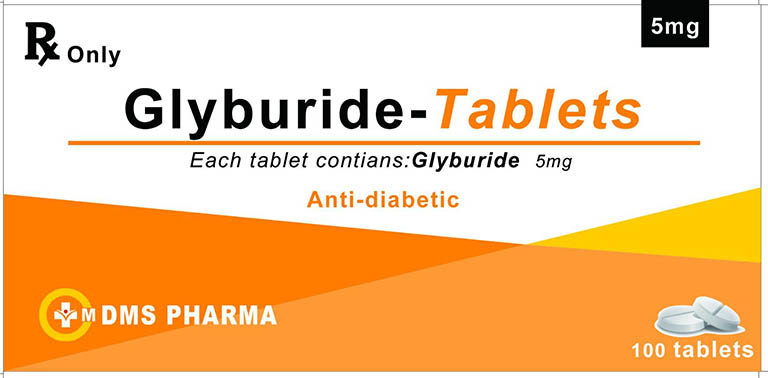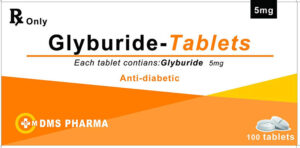Glibenclamide – Glyburide (Daonil, Euglucon)
Glibenclamide, also known as glyburide, is an oral hypoglycemic agent commonly used in the management of Type 2 diabetes mellitus. It belongs to the class of drugs called sulfonylureas and works by stimulating insulin release from the pancreas.
Mechanism of Action
- Insulin Release Stimulation
Glibenclamide binds to specific receptors on pancreatic beta cells, inhibiting ATP-sensitive potassium channels. This depolarizes the cell, leading to the opening of voltage-gated calcium channels and subsequent insulin release.
- Enhances Insulin Sensitivity
It also improves the sensitivity of peripheral tissues (such as muscles and fat cells) to insulin, which helps lower blood glucose levels.
Uses of Glibenclamide
- Type 2 Diabetes Mellitus:
Glibenclamide is primarily used to control blood glucose in individuals with Type 2 diabetes, particularly in those who do not achieve adequate control with diet and exercise alone.
- Monotherapy or Combination Therapy
You can use it alone or in combination with other anti-diabetic medications like metformin or insulin.
- Off-label Uses
Occasionally used in cases of gestational diabetes or in managing postprandial glucose spikes.
Side Effects of Glyburide (Glibenclamide)
- Hypoglycemia
The most common side effect, particularly if meals are skipped, excessive exercise is performed, or alcohol is consumed.
- Weight Gain
Due to increased insulin levels, patients may experience weight gain.
- Gastrointestinal Disturbances
Nausea, vomiting, and abdominal discomfort may occur.
- Skin Reactions
Rashes, itching, or photosensitivity may develop in some individuals.
- Hematological Effects
Rare cases of leukopenia, thrombocytopenia, and anemia.
- Liver Dysfunction
Elevated liver enzymes may be observed in rare instances.
- Allergic Reactions
Some patients may develop hypersensitivity reactions, including anaphylaxis.
Contraindications
- Hypersensitivity
Contraindicated in patients with a known allergy to sulfonylureas or any component of the formulation.
- Type 1 Diabetes Mellitus
Not effective for Type 1 diabetes as the pancreas cannot produce insulin.
- Severe Renal or Hepatic Impairment
Should be avoided in individuals with severe liver or kidney dysfunction.
- Diabetic Ketoacidosis
Not suitable for acute diabetic complications like ketoacidosis or hyperosmolar coma.
- Pregnancy and Breastfeeding
Glibenclamide is contraindicated during pregnancy, particularly in the first trimester, due to potential fetal harm. It is also not recommended during breastfeeding.
Drug-Drug Interactions
-
Increased Risk of Hypoglycemia:
- Alcohol: Increases the risk of hypoglycemia by enhancing insulin action.
- Other Hypoglycemic Agents: When combined with other oral anti-diabetic agents or insulin, it may increase the risk of low blood sugar.
- Beta-Blockers: May mask the symptoms of hypoglycemia and interfere with blood sugar regulation.
-
Decreased Effectiveness
:
- Corticosteroids: Can increase blood glucose levels and reduce the effectiveness of glibenclamide.
- Thiazide Diuretics: May counteract the effects of glibenclamide and increase blood sugar.
-
Altered Drug Metabolism:
- Antifungals (e.g., Ketoconazole): May increase glibenclamide levels by inhibiting its metabolism.
- Anticonvulsants (e.g., Phenytoin, Phenobarbital): May reduce glibenclamide effectiveness by increasing its breakdown.
Dosage Forms:
- Tablets:
- Common strengths: 2.5 mg, 5 mg, and 10 mg.
- The tablets are typically taken once or twice daily, with or after meals.
- Oral suspension:
- Some formulations come as an oral suspension (less common than tablets).
Dosing Guidelines of Glyburide
- Initial dose:
- Usually, the starting dose is 2.5 to 5 mg once daily, taken with breakfast or the first main meal of the day.
- Titration:
- The dose may be gradually increased based on the patient’s blood glucose levels, typically by 2.5 mg increments every 1-2 weeks, to a maximum dose of 20 mg per day.
- Maximum dose:
- The maximum recommended dose is 20 mg/day, divided into one or two doses.
- Maintenance dose:
- Often, the maintenance dose is in the range of 5-10 mg/day.
Popular Brands of Glibenclamide or Glyburide
- Daonil: A well-known brand, available in various strengths.
- Euglucon: Another popular brand, commonly prescribed for Type 2 diabetes management.
- Glibenclamide-Astra: Manufactured by AstraZeneca, used as a treatment for Type 2 diabetes.
- Gliben: A generic form available in different dosage forms.
Conclusion
Glibenclamide also known as glyburide is a key medication in the management of Type 2 diabetes, effectively lowering blood glucose levels. While it is effective, it must be used with caution due to its potential side effects and drug interactions. Proper monitoring and patient education are essential for safe and effective treatment.

